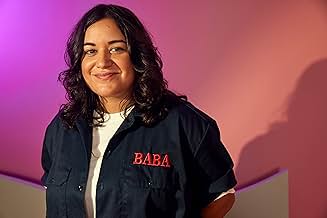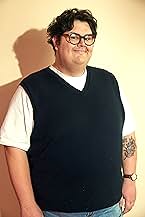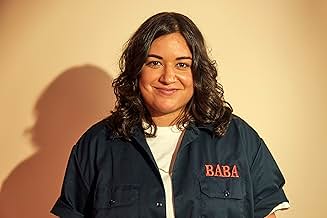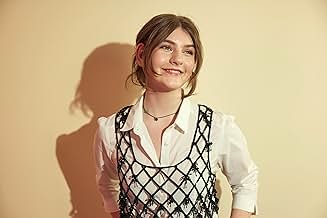IMDb RATING
6.4/10
4.2K
YOUR RATING
Sam, a stand-up comedian struggling with PTSD, weighs whether or not to join the search for a missing teenage girl she used to nanny.Sam, a stand-up comedian struggling with PTSD, weighs whether or not to join the search for a missing teenage girl she used to nanny.Sam, a stand-up comedian struggling with PTSD, weighs whether or not to join the search for a missing teenage girl she used to nanny.
- Awards
- 8 nominations total
- Director
- Writer
- All cast & crew
- Production, box office & more at IMDbPro
Featured reviews
I USED TO BE FUNNY is an above-average mumblecore offering starring Rachel Sennott. Considering how quickly Rachel Sennott has blown up since the confusingly popular BOTTOMS has come out, it almost feels like she owed someone a favor doing this movie. While the movie mostly feels marketed as a comedy, the film itself primarily exists in the realm of heavy-handed drama, and when they do try to infuse comedy, it rarely lands. While the plot is pretty unique and ambitious for this kind of film, it also somehow felt a bit misdirected. On that note, there are certain movies (and often books) that you can consume where you feel almost certain that this story is primarily just something that its writer straight up went through and decided to turn into a feature length media offering - this is 100% one of those movies. My gut tells me that the writer simply went through all of this herself, and decided to tell the story, perhaps primarily because the combination of things feels so specific that it doesn't seem like someone would pair these two themes together any other way, namely the standup comedy details with the nannying plot points. The subject matter isn't interesting enough for someone to focus on without having been through it in reality, I feel, and sadly, it's not quite interesting enough as a movie either. While Sennott's performance is the strongest thing about the entire movie, with it being as dynamic and enjoyable as hers generally are, it doesn't fulfill in many other ways in the end - the only other thing I really found enjoyable in the end was its ambition. Worth watching once for (divine lordess) Sennott fans - not sure who else.
Sam Cowell (Rachel Sennott) is a stand-up comic with some success who does a bit of work as a nanny. Her 14 year old former charge Brooke Renner (Olga Petsa) is declared missing and shows up smashing her door in anger. Two years earlier, Sam gets hired by Cameron Renner (Jason Jones) to watch his 12 year old daughter while his wife is sick in the hospital.
The first half is intriguing. The mystery of the incident keeps my interest. Once it's revealed, the movie goes into Lifetime territories. The one glaring problem is the aunt's presence. Sam would notify her at every step. The fact that she exists is an exit ramp for Sam to take. That diminishes the intensity of the story. If she doesn't exist, Brooke would be running away from a foster home. The police could be less than co-operative. Then Sam would feel like she's Brooke's only hope. That would raise the intensity of the second half. As for Olga Petsa, she's a little old to play a 12 year old. Brooke's young age is very important to her feelings. Otherwise, Sennott is excellent. I can see this story working, but it needs some changes.
The first half is intriguing. The mystery of the incident keeps my interest. Once it's revealed, the movie goes into Lifetime territories. The one glaring problem is the aunt's presence. Sam would notify her at every step. The fact that she exists is an exit ramp for Sam to take. That diminishes the intensity of the story. If she doesn't exist, Brooke would be running away from a foster home. The police could be less than co-operative. Then Sam would feel like she's Brooke's only hope. That would raise the intensity of the second half. As for Olga Petsa, she's a little old to play a 12 year old. Brooke's young age is very important to her feelings. Otherwise, Sennott is excellent. I can see this story working, but it needs some changes.
As a person who has also experienced trauma, I've often wondered - how would I ever approach writing a book or movie about my experiences, and honestly the way this movie used flashbacks did resonate with me.
I can understand how some might feel it's disjointed, but honestly that's sometimes how living with PTSD, depression, etc. Feels like.
I know some people complained that it's not funny, I guess I didn't expect it to be laugh out loud funny based on the description - it literally includes PTSD in the description and is called "I used to be funny" - i.e. She doesn't feel funny anymore.
Overall, I appreciated the storytelling.
I can understand how some might feel it's disjointed, but honestly that's sometimes how living with PTSD, depression, etc. Feels like.
I know some people complained that it's not funny, I guess I didn't expect it to be laugh out loud funny based on the description - it literally includes PTSD in the description and is called "I used to be funny" - i.e. She doesn't feel funny anymore.
Overall, I appreciated the storytelling.
I found the description of this movie to be deceptive. The story is about a former comedian where something happened that derailed her life.
The description says PSTD but what this trauma event is it not immediately revealed. The movie spends the three quarters of the time dancing around something having happened.
The dialog tries to be hip about teenage topics but it is mostly just cringe. No cap.
Much of the story is told as flash backs interweaved into the present so such it's never really clear when anything is occurring until several beats into a scene. I found this all irritating and bad story telling.
The movie eludes to what may have happened and while it's possible to guess, it's makes it all the worse that they don't just say it.
Everyone in the movie knows what happened but we are left out of being shared the details. Conversations about the event happen over and over to the point of becoming fraying, like an inside joke that no one will explain to you until you start to wonder if the pay off will be worth it.
It won't.
This fake tension is bad story telling. There is a missing child and the description creates a narrative that this is a big part of the movie but it's simply not. Our main character spends most of the movie unconcerned about the child's whereabouts. Its only purpose is to provide an ending to an otherwise meandering mess of a movie.
The description says PSTD but what this trauma event is it not immediately revealed. The movie spends the three quarters of the time dancing around something having happened.
The dialog tries to be hip about teenage topics but it is mostly just cringe. No cap.
Much of the story is told as flash backs interweaved into the present so such it's never really clear when anything is occurring until several beats into a scene. I found this all irritating and bad story telling.
The movie eludes to what may have happened and while it's possible to guess, it's makes it all the worse that they don't just say it.
Everyone in the movie knows what happened but we are left out of being shared the details. Conversations about the event happen over and over to the point of becoming fraying, like an inside joke that no one will explain to you until you start to wonder if the pay off will be worth it.
It won't.
This fake tension is bad story telling. There is a missing child and the description creates a narrative that this is a big part of the movie but it's simply not. Our main character spends most of the movie unconcerned about the child's whereabouts. Its only purpose is to provide an ending to an otherwise meandering mess of a movie.
Ally Pankiw's feature debut "I Used to be Funny" competently explores fragile experiences of depression and PSTD, recovering from assault, and child endangerment with a tame dose of fragile drama, sprinkled with witty humour.
Pankiw's choice to present the story through sequencing between Sam's mission to find a missing Brooke, the young girl she nannied, and frequent flashbacks of memories of the two's once-close bond. While the concept of a non-linear narrative is meant to efficiently expand the dynamics and pasts of the characters and their journeys, which it technically achieves for the majority of the film. The beginning of this sequence felt static as the vague nature that shrouded the connection between Sam, her trauma, and her past with Brooke, overstayed its welcome in the first third of the story. However, the pace thankfully accelerates once the first clues of Brooke's disappearance are uncovered.
Some elements of the film at times, lean too hard into melodrama that lacks actual substance, especially in the vague and unmoving first third of the film. Cuts to some flashbacks that felt somewhat cliche a script that at times felt too expository, and perhaps two-too-many Phoebe Bridgers needle drops; tools that ask the audience to engage with the characters and the mysterious tragedy that haunts them. These elements may have been appropriate in the context of a television episode, considering Pankiw's background in TV direction, but unfortunately fell flat within a full-length feature film.
Amidst these faults, one of the film's greatest strengths is its talented cast. Rachel Sennott's has not only cemented herself as a star of off-beat and relatable comedy but also demonstrated a striking capacity for performances filled with intense vulnerability, harmoniously embodying all relevant elements of the tragicomedy genre. Her ability to foster chemistry with the rest of the cast only adds further dimension to the sorrow and humor that defines her character's journey.
Overall, I Used to Be Funny poses an intimate image of how trauma can take control of our lives and sense of self-worth. While bleak, the potential for healing is also presented as the empathetic and hopeful conclusion to Sam and Brooke's journey. While the film's approach at times lacks the ingenuity and impact it clearly intended to bring, it remains that Pankiw's strength lies in how she stays firm with the difficult themes and issues she addresses.
Pankiw's choice to present the story through sequencing between Sam's mission to find a missing Brooke, the young girl she nannied, and frequent flashbacks of memories of the two's once-close bond. While the concept of a non-linear narrative is meant to efficiently expand the dynamics and pasts of the characters and their journeys, which it technically achieves for the majority of the film. The beginning of this sequence felt static as the vague nature that shrouded the connection between Sam, her trauma, and her past with Brooke, overstayed its welcome in the first third of the story. However, the pace thankfully accelerates once the first clues of Brooke's disappearance are uncovered.
Some elements of the film at times, lean too hard into melodrama that lacks actual substance, especially in the vague and unmoving first third of the film. Cuts to some flashbacks that felt somewhat cliche a script that at times felt too expository, and perhaps two-too-many Phoebe Bridgers needle drops; tools that ask the audience to engage with the characters and the mysterious tragedy that haunts them. These elements may have been appropriate in the context of a television episode, considering Pankiw's background in TV direction, but unfortunately fell flat within a full-length feature film.
Amidst these faults, one of the film's greatest strengths is its talented cast. Rachel Sennott's has not only cemented herself as a star of off-beat and relatable comedy but also demonstrated a striking capacity for performances filled with intense vulnerability, harmoniously embodying all relevant elements of the tragicomedy genre. Her ability to foster chemistry with the rest of the cast only adds further dimension to the sorrow and humor that defines her character's journey.
Overall, I Used to Be Funny poses an intimate image of how trauma can take control of our lives and sense of self-worth. While bleak, the potential for healing is also presented as the empathetic and hopeful conclusion to Sam and Brooke's journey. While the film's approach at times lacks the ingenuity and impact it clearly intended to bring, it remains that Pankiw's strength lies in how she stays firm with the difficult themes and issues she addresses.
Did you know
- TriviaDirector Ally Pankiw was dating Muna member Naomi McPherson during the production of the film, but have since broken up. Naomi is still second to the top of special thanks during credits, and two Muna songs feature during the film.
- How long is I Used to Be Funny?Powered by Alexa
Details
- Release date
- Countries of origin
- Language
- Also known as
- Колись я була смішною
- Production companies
- See more company credits at IMDbPro
Box office
- Gross US & Canada
- $171,756
- Opening weekend US & Canada
- $29,499
- Jun 9, 2024
- Gross worldwide
- $171,756
- Runtime1 hour 45 minutes
- Color
- Aspect ratio
- 2.00 : 1
Contribute to this page
Suggest an edit or add missing content








































